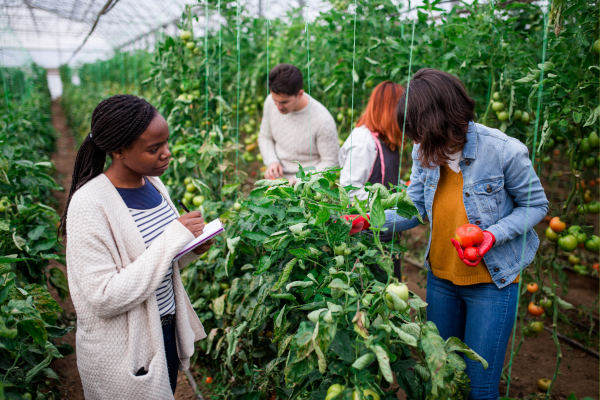Agriculture recruitment plays a vital role in ensuring that farms and agricultural businesses meet their production goals during peak times. The summer harvest season is particularly demanding, requiring a significant increase in labor to manage the harvesting, processing, and distribution of crops. Effective seasonal hiring can significantly impact productivity and profitability by ensuring that there are enough skilled workers to handle the increased workload.
Peak Demand During Summer Harvest Season

The summer season is the busiest period for agriculture, as many crops reach their peak maturity and require immediate harvesting. Timely recruitment during this period is crucial to prevent crop loss and maintain high levels of productivity. A well-planned seasonal hiring strategy not only supports the immediate labor needs but also contributes to the overall efficiency and success of the agricultural business.
Seasonal Hiring Importance
Critical Role in Meeting Peak Demand
Seasonal hiring is essential for agriculture recruitment, particularly during the summer months when the demand for labor spikes. Farms and agricultural businesses depend on a timely influx of workers to handle the intensive tasks associated with harvesting, processing, and distribution. Without adequate seasonal staffing, these businesses risk falling behind on their production schedules, which can lead to significant financial losses.
Impact on Productivity and Profitability
Timely and effective agriculture recruitment during the peak summer season directly impacts productivity and profitability. Having a reliable workforce ensures that crops are harvested at their optimal time, maintaining their quality and market value. Furthermore, well-timed recruitment prevents delays in processing and distribution, which can affect the freshness and availability of produce in the market. In the long run, efficient seasonal hiring supports sustainable agricultural practices and business growth.
Understanding the Demand
Peak Season in Agriculture
Summer is the peak season for agriculture due to the maturation of many crops that require immediate harvesting. During this time, the workload increases significantly, necessitating a larger workforce to manage the demands. The maturity and harvesting needs of various crops make this period particularly labor-intensive, highlighting the importance of proactive agriculture recruitment to ensure that all tasks are completed efficiently.
Specific Crops with Peak Harvesting Times
Fruits
- Strawberries, blueberries, and raspberries all reach their peak during the summer months. These fruits require careful and timely harvesting to preserve their quality.
- Although some apple varieties are harvested in late summer, they demand a considerable amount of labor for picking and processing.
- Peaches also reach maturity in the summer, necessitating swift harvesting to maintain their flavor and texture.
Vegetables:
- Sweet corn is a staple summer crop that requires efficient harvesting techniques to ensure it reaches consumers while fresh.
- Tomatoes ripen during the summer and need timely picking to avoid overripening and spoilage.
Other Produce:
- Watermelons and cantaloupes mature in the summer and require prompt harvesting to maximize their market value.
- Some leafy greens, like lettuce and spinach, also have summer harvesting periods that require careful handling to prevent wilting.
By understanding the specific demands of these crops, agricultural businesses can better plan their seasonal hiring strategies to ensure they have the necessary workforce to handle the peak workload efficiently.
Strategies for Effective Seasonal Hiring
Early Planning for Agriculture Recruitment
Importance of Early Recruitment
In agriculture recruitment, starting the hiring process early is critical to ensuring a sufficient workforce is in place before the peak season begins. Early planning allows agricultural businesses to identify their labor needs well in advance, creating a buffer against potential shortages. By beginning recruitment efforts months before the summer harvest, employers can attract a broader pool of candidates and have ample time to vet and train new hires.
Ensuring Workforce Readiness
To avoid last-minute scrambles, agricultural businesses should develop a clear timeline for their recruitment activities. This includes advertising job openings, conducting interviews, and finalizing hires well before the season starts. Having a ready workforce means that as soon as the crops are ready for harvest, the team can hit the ground running, thereby maximizing productivity and ensuring that all tasks are completed efficiently.
Local Recruitment in Agriculture
Tapping into Local Talent Pools
Local recruitment is a strategic approach in agriculture recruitment, particularly during the summer when high school and college students are on break and seeking temporary employment. By focusing on local talent pools, agricultural businesses can find workers who are readily available and familiar with the area, reducing the logistical challenges associated with hiring non-local workers.
Targeting Students for Seasonal Work
High school and college students are an excellent source of seasonal labor. These individuals are often eager for work during their summer break and can provide the necessary manpower for the busy harvest season. Agricultural businesses can collaborate with local schools and community organizations to advertise job openings and attract students looking for summer employment.
Utilizing Technology for Agriculture Recruitment
Leveraging Online Job Boards
Online job boards are a powerful tool for agriculture recruitment. Platforms like Indeed, Glassdoor, and specialized agricultural job sites allow employers to reach a wide audience quickly and efficiently. By posting job openings online, agricultural businesses can attract candidates from various locations, increasing their chances of finding qualified workers.
Using Social Media Platforms
Social media platforms such as Facebook, LinkedIn, and Instagram can also be instrumental in seasonal hiring. These platforms enable businesses to promote job openings to a broader audience, including younger demographics who are active on social media. Utilizing targeted ads and engaging content can help attract potential candidates and drive interest in seasonal job opportunities.
Attracting the Right Talent
Competitive Wages in Agriculture Recruitment
Offering Attractive Compensation
To attract experienced and reliable workers, offering competitive wages is essential. Agricultural businesses should research prevailing wage rates and ensure their compensation packages are appealing to potential hires. In addition to base pay, highlighting any incentives such as performance bonuses or end-of-season rewards can further entice candidates to join the workforce.
Highlighting Incentives
Incentives play a crucial role in attracting top talent. Performance bonuses for meeting harvest targets, end-of-season rewards, and other benefits can make a job offer more attractive. By emphasizing these incentives in job advertisements and during the recruitment process, agricultural businesses can stand out from the competition and draw in skilled workers.
Flexible Scheduling in Agriculture Recruitment
Providing Work Schedule Options
Flexible work schedules are highly attractive to seasonal workers, particularly students and other temporary employees. Offering part-time options or flexible hours can accommodate different types of workers and make the job more appealing. This flexibility can help attract a diverse workforce and ensure that all labor needs are met during the peak season.
Accommodating Different Worker Types
Different workers have varying availability and preferences. By providing flexible scheduling options, agricultural businesses can attract a broader range of candidates, including those who may only be able to work part-time or have other commitments. This approach can help ensure that the workforce is well-rounded and capable of handling the demands of the summer harvest.
Training and Onboarding

Efficient Training Programs in Agriculture Recruitment
Quick and Effective Training
Implementing quick and effective training programs is vital in agriculture recruitment. Seasonal workers need to be brought up to speed rapidly to ensure they can perform their tasks efficiently. Training programs should focus on essential skills, safety protocols, and efficient harvesting techniques to minimize downtime and maximize productivity.
Focus on Safety and Efficiency
Safety protocols are crucial in the agricultural industry. Training programs should prioritize educating new hires on safe working practices to prevent accidents and injuries. Additionally, teaching efficient harvesting techniques can help workers perform their duties more effectively, leading to higher productivity and better crop yields.
Mentorship for New Employees
Pairing with Experienced Workers
Mentorship programs can significantly enhance the onboarding process for new employees. Pairing new hires with experienced workers provides guidance and support, helping them acclimate to their roles more quickly. Mentorship can also foster a positive work environment, improve morale, and increase overall productivity from day one.
Improving Productivity
Experienced workers can share their knowledge and best practices with new hires, improving the overall efficiency of the workforce. This mentorship ensures that new employees are well-prepared to handle their tasks and contribute to the success of the harvest season. By investing in mentorship, agricultural businesses can create a more cohesive and effective team.
Retention Strategies in Agriculture Hiring

Positive Work Environment
Fostering a Positive and Supportive Work Environment
Creating a positive and supportive work environment is crucial for retaining seasonal workers in agriculture hiring. A workplace that promotes respect, teamwork, and open communication can significantly improve worker satisfaction and morale. By fostering a culture where employees feel valued and supported, agricultural businesses can enhance productivity and reduce turnover rates.
Recognizing and Rewarding Hard Work and Dedication
Recognition and rewards play a significant role in retaining employees. Regularly acknowledging the hard work and dedication of seasonal workers can boost morale and encourage continued high performance. Implementing reward programs, such as employee of the month, performance bonuses, and public recognition, can motivate workers and foster a loyal and committed workforce.
Opportunities for Return Employment
Offering Incentives for Seasonal Workers to Return
One effective strategy in agriculture hiring is to offer incentives for seasonal workers to return in subsequent seasons. Providing benefits such as rehire bonuses, loyalty programs, or increased pay for returning workers can encourage experienced employees to come back, reducing the need for extensive retraining and ensuring a reliable workforce.
Building a Reliable and Experienced Workforce Over Time
By encouraging seasonal workers to return year after year, agricultural businesses can build a reliable and experienced workforce. This continuity not only enhances productivity but also improves the overall quality of work. Experienced workers require less training and can often take on leadership roles, further supporting the efficiency of the team during peak seasons.
Compliance and Legal Considerations in Agriculture Hiring
Labor Laws
Overview of Relevant Labor Laws and Regulations
Compliance with labor laws is essential in agriculture hiring to avoid legal issues and ensure fair treatment of workers. Employers must be aware of and adhere to local, state, and federal employment laws, which govern wages, working hours, overtime, and working conditions. Understanding these regulations helps protect the rights of workers and promotes a fair and safe working environment.
Ensuring Compliance with Employment Laws
Agricultural businesses should establish protocols to ensure compliance with all relevant labor laws. This includes keeping accurate records of working hours, wages paid, and maintaining a safe workplace. Regular audits and consultations with legal experts can help ensure ongoing compliance and address any potential legal issues proactively.
Health and Safety Measures in Agriculture Hiring
Workplace Safety
Implementing Safety Measures to Protect Workers
Workplace safety is paramount in agriculture hiring, especially during peak seasons when the workload increases. Implementing comprehensive safety measures, such as providing personal protective equipment (PPE), ensuring machinery is well-maintained, and setting up emergency protocols, can protect workers from injuries and accidents.
Regular Training on Safety Protocols
Regular training sessions on safety protocols are essential to keep workers informed and prepared. Training should cover topics such as proper equipment use, handling hazardous materials, and emergency response procedures. Continuous education on safety can reduce the risk of accidents and create a safer working environment.
Health Benefits
Providing Health Benefits or Access to Medical Facilities
Offering health benefits or access to medical facilities can significantly improve the well-being of seasonal workers. Health benefits may include on-site medical care, health insurance, or partnerships with local clinics. Ensuring that workers have access to medical services can help address health issues promptly and maintain a healthy workforce.
Importance of Health Insurance for Seasonal Workers
Health insurance is a critical component of worker benefits, providing financial protection against medical expenses. Offering health insurance to seasonal workers can improve job satisfaction and loyalty, as workers feel more secure knowing they have coverage in case of illness or injury. This, in turn, supports retention and overall worker well-being.
Effective seasonal hiring in agriculture is essential for maximizing productivity during the peak summer harvest. Strategic agriculture hiring practices, including early planning, local recruitment, and leveraging technology, ensure a ready and capable workforce. Comprehensive training, competitive wages, flexible scheduling, and a positive work environment enhance retention and performance. Building a dependable seasonal workforce leads to long-term operational success. Request a demo from GoToro today to streamline your agriculture hiring process and achieve your seasonal recruitment goals.


